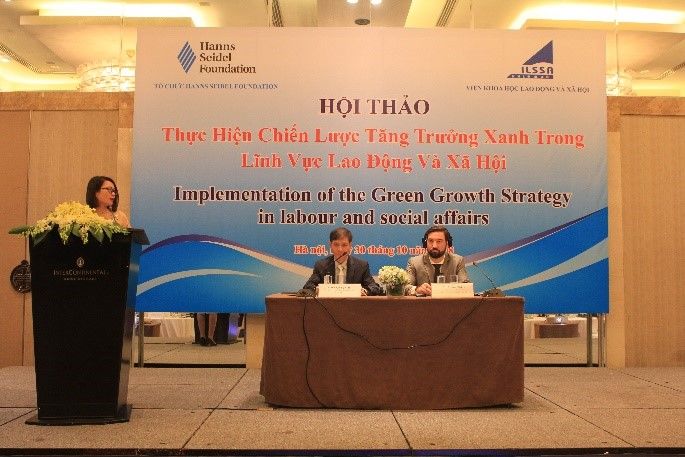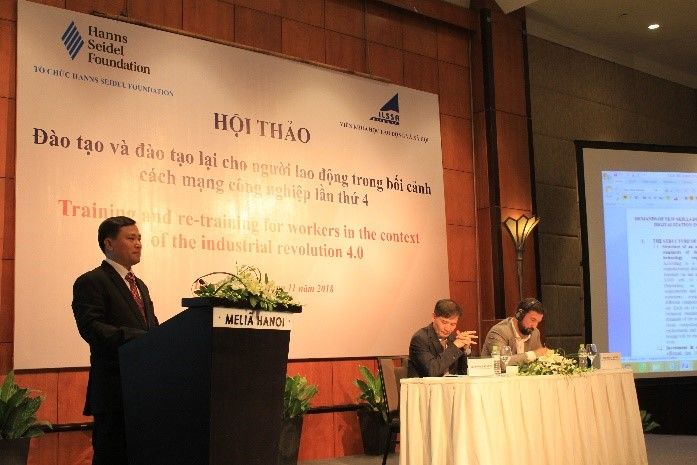Workshop about the Industrial Revolution 4.0
The Fourth Industrial Revolution and its impacts on the labour market of Vietnam

Moritz Michel, Deputy Director of the Hanns Seidel Foundation and Dr. Đao Quang Vinh, Director of ILLSA
HSF
Industrial Revolution 4.0 (I4.0)
The fourth industrial revolution is embossed by an advancing of technology and digitization and will foster an increasing demand of high-skilled laborers and will change the structure of the Vietnamese labour market. The I4.0 will also create a large number of creative work force in the field of science and evoke a positive change in the employment and need of labour skills in enterprises from unskilled to semi-skilled and high-skilled. Along with the positive changes, further challenges emerge and affect the current situation in Vietnam.
Positive potential impacts on the labour market are new job opportunities, an increase of labour productivity and an improvement of work safety. As labour skills and requirements will raise the wages will be adjusted and encourage customers´ needs. The raise of wages and reduced working hours will create more demand for employees in entertainment and the services industry. On one side there will be new job opportunities and on the other hand there will be a loss of jobs because of technology or robots and jobs are at risk to be replaced by automation. A high level of risk by automation are jobs as treasurers, typewriters or machine operators. Doctors, lawyers, managers or safeguards are in risk of low automation while creative intelligence (artworks), social intelligence (social awareness, emotion, negotiation) or manual manipulation (craftsmanship) are in no risk as they are unable in automation. Jobs in the electrical and textile industry will be most affected by the I4.0.
“The biggest challenges for transferring and applying new technologies for enterprises are:
- labour skill shortage in labour force in Vietnam: 91 percent
- Financial challenges from investing in new technology: 85 percent of enterprises
- There is no orientation and preparation for adapting with technology transfer in long term: 89 percent”
(Source: Institute of Labour and Science for Social Affairs, Vietnam)
Vocational training in the context of the industrial revolution 4.0
The impacts of the I4.0 on the labour market have also an influences on the vocational training in Vietnam. Until now the supply and demand do not meet which causes labour skill shortages. To meet the demands it is necessary that Vietnam significantly reform its education system, from a general to a higher education system. The networking between the companies and the vocational training system must be improved in order to meet the new requirements on the labour market.
To achieve a successful reform in the vocational training it is important that enterprises and schools recognize the benefits that collaboration can bring. The most effective method would be that schools and companies actively find each other and establish practical training programs to provide a high quality formation which leads in the end to high-skilled employees. The cooperation can be expressed in various ways to meet the respective needs. That could range from the active introduction of research topics, transfer of products by teachers or referrals of human resources.
During the workshop Assoc. Prof. Dr. Pham Van Son, Ministry of Education and Training, held a presentation about “Educational reforms in response to the labour market demands in the industrial revolution 4.0”. According to him the education centers are training professionals without orientating to the needs of the labour market. Furthermore when restructuring, companies are not particularly happy to offer reshuffling to their employees if they are over 35 while the employees themselves do not qualify voluntarily and self-confidently. Therefore, three main stakeholders (government and educational institutions, companies and employees) should participate responsible in the education and transformation process in context 4.0.

Mr. Nguyen Van Hong – Head of the General Management, JAC Limited Liability Joint-Stock Company Viet Nam, participating at the discussion during the workshop
HSF
One Day Workshop in Hanoi, Vietnam
The workshop highlighted challenges and opportunities of the Industrial Revolution 4.0. The high-quality and diverse list of participants gave a wide-ranging look on different aspects and problems caused by the Industrial Revolution 4.0. The program aimed to get a deeper impression about the following topics:
1) Education reform to compline with requests of industrial revolution 4.0
2) Augmented Reality (AR) Trend in Vietnam and education challenges of human resources in Vietnam
3) Working skills, requested by new technologies and digitization in the automobile industry
4) Challenges and difficulties in vocation training in the context of digitization and industrial revolution
5) Enhance the combination between vocational training agencies and entrepreneurs in the context of digitization and industrial revolution
Fruitful discussions could be held based on presentations from experts of several departments and industries. Two experts of ILLSA, host of the workshop, gave an interesting insight into the “Industrial revolution 4.0 and the challenges for employment and labour skills in Vietnam” and the “Evaluation on the effectiveness of linkages in vocational education and utilization of trained workers”.
In the end, both the foundation and ILSSA managed to bring critical attention to the need of vocational training and the reformation of the educational system to meet the needed requirements of the industrial revolution 4.0.
The Work between ILSSA and HSF
One important pillar of the work of the Hanns Seidel Foundation is the cooperation with different think-tanks to provide training to government managers, ministerial officials and private-sector decision makers. ILLSA is an important partner to realize our goals and in the past years, our effective partnership has made a significant contribution to improve the social policy in Vietnam.
